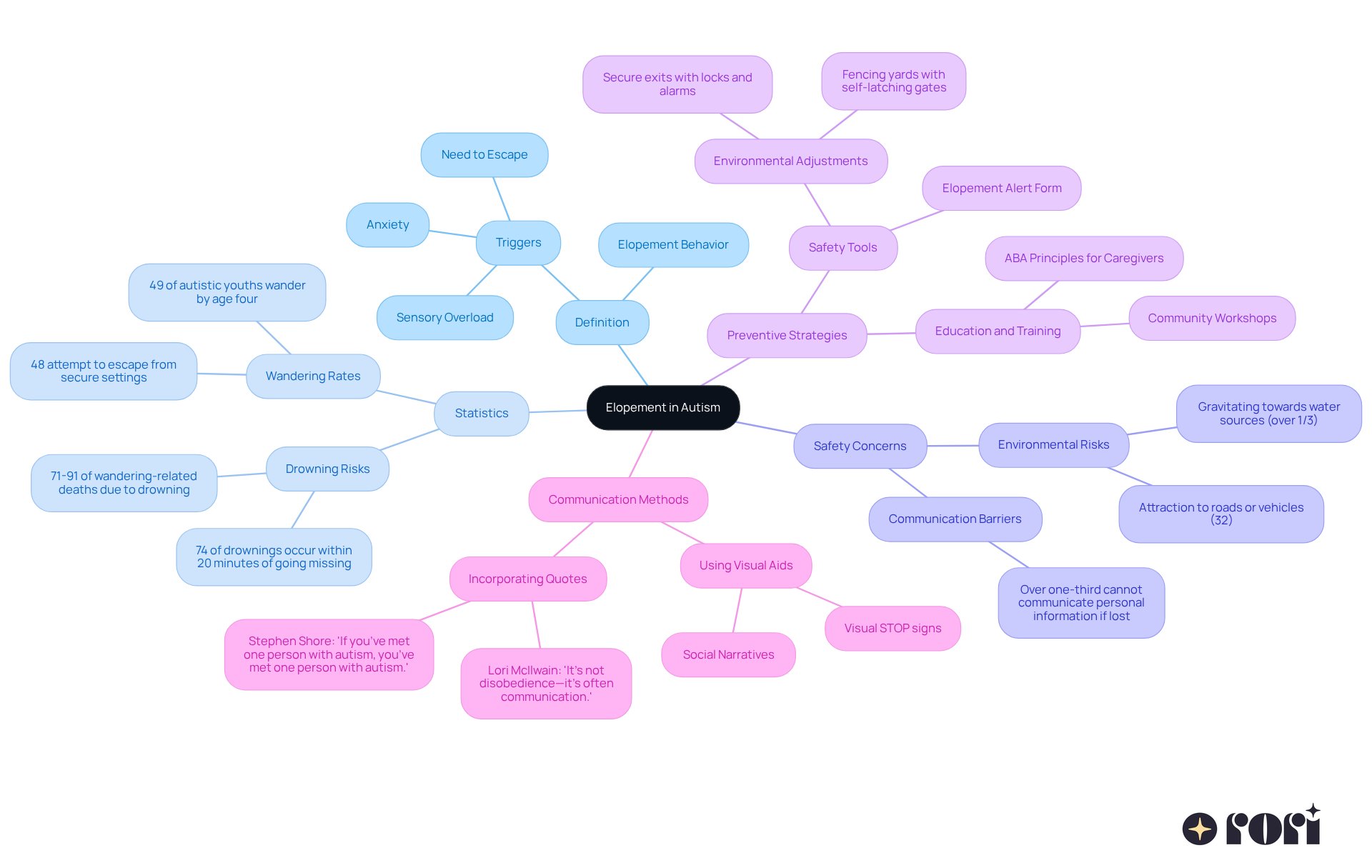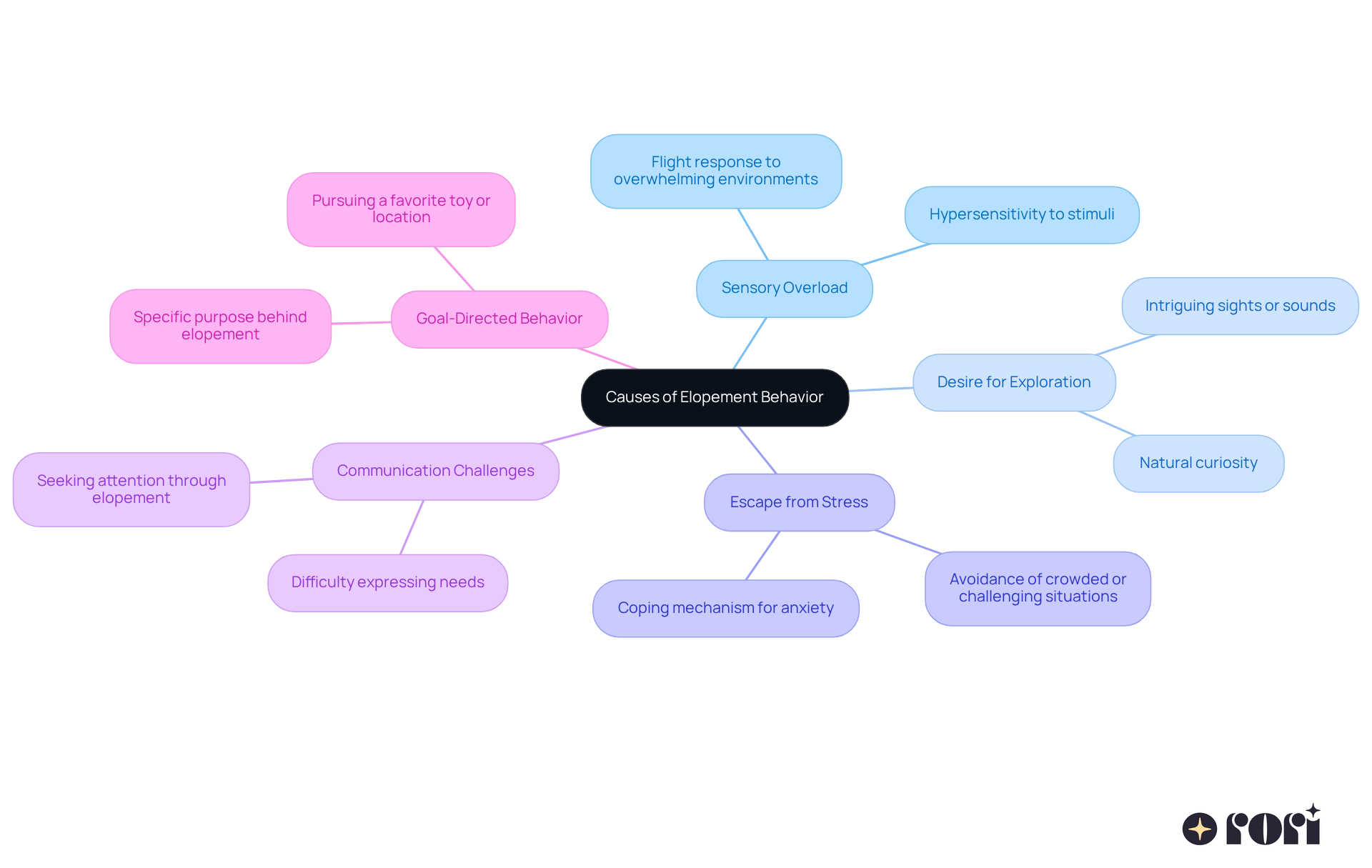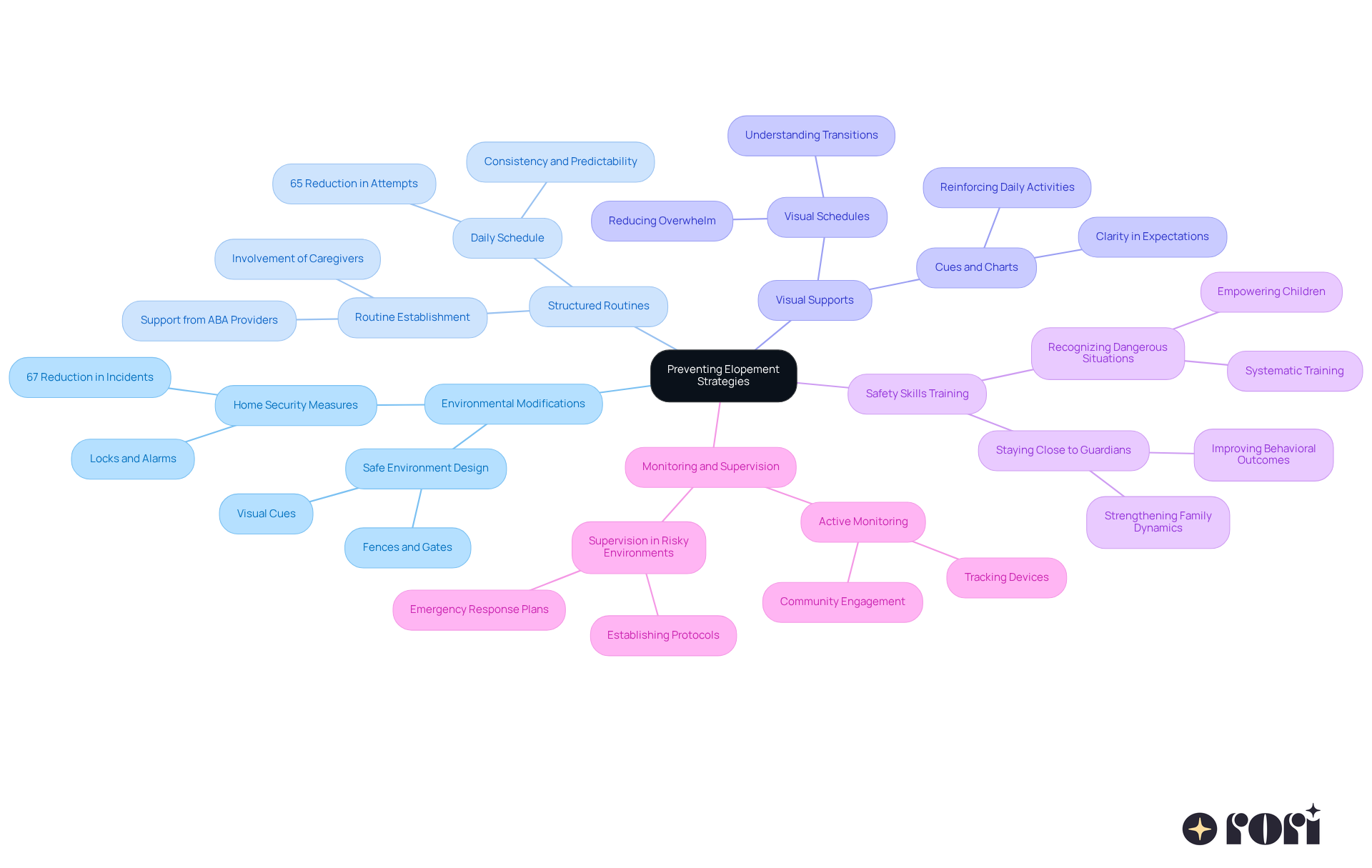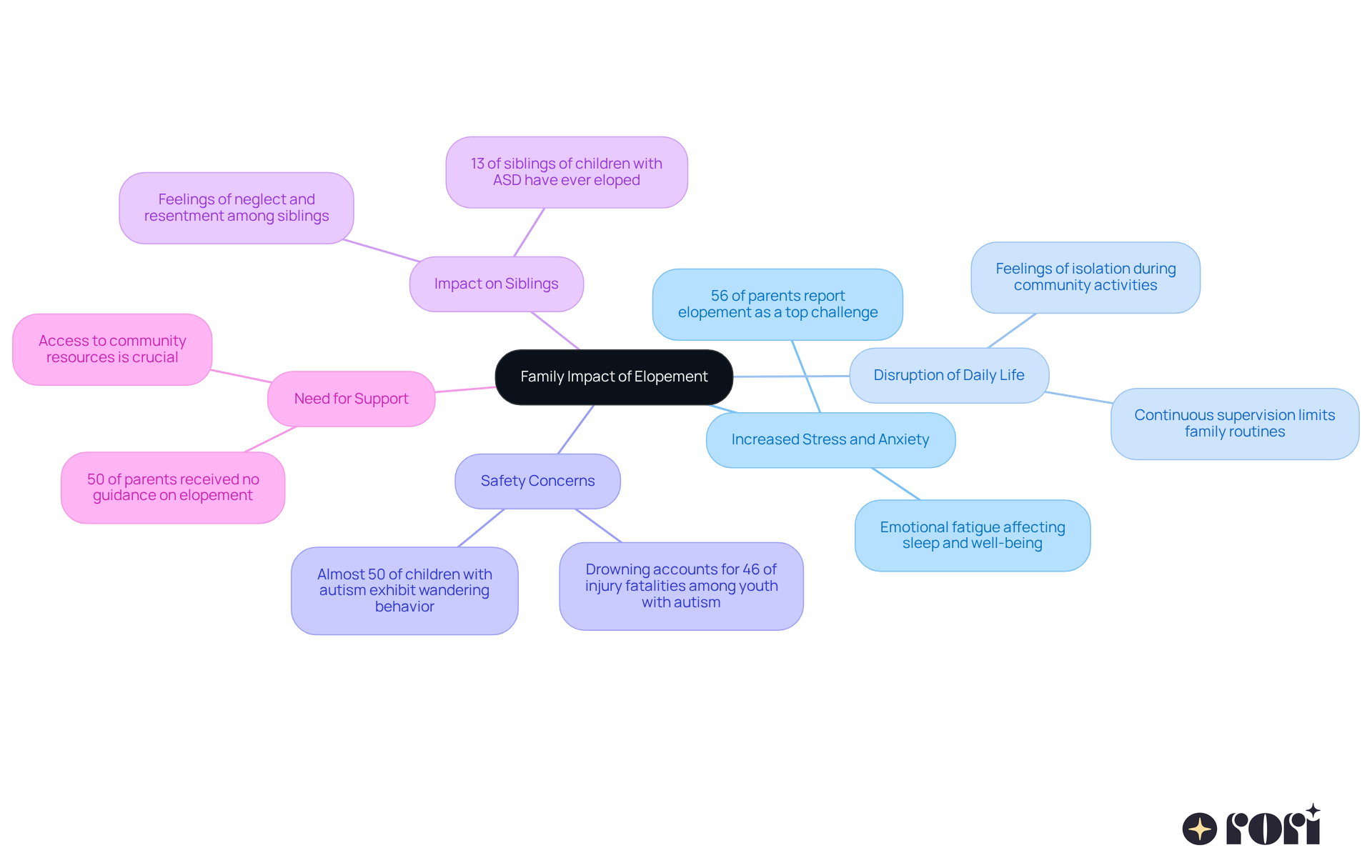Elopement in autism is when a child with autism leaves a safe space without permission. This behavior can often be triggered by sensory overload, anxiety, or communication challenges. Understanding this behavior is crucial for parents. It helps them implement effective safety strategies and preventive measures to keep their children safe from potential dangers associated with wandering.
Let’s explore this together! By recognizing the signs and triggers, parents can feel more empowered to address these situations. For instance, a child might bolt during a crowded event, feeling overwhelmed. Knowing this can help parents prepare and respond appropriately.
We’re here to help you every step of the way! By sharing experiences and strategies, we can create a supportive community. Remember, you’re not alone in this journey. Together, we can find solutions that work for your family.
Understanding elopement in children with autism is crucial for parents navigating the complexities of this behavior. Often misunderstood as mere disobedience, elopement can stem from various triggers like sensory overload, anxiety, or simply the instinct to explore. With nearly half of autistic youths wandering away from safe environments, the urgent need for effective prevention strategies becomes clear.
So, how can families transform this challenge into an opportunity for safety and connection? Let’s explore this together! This article delves into the meaning of elopement, its causes, and actionable strategies to safeguard children while fostering understanding and support within families. We’re here to help you every step of the way!
Elopement autism meaning refers to the situation when a child with autism spectrum disorder (ASD) leaves a safe, monitored environment without permission or notice. This behavior can look like running away, bolting, or wandering off, which can lead to dangerous situations. Understanding the elopement autism meaning is important, as it reveals that elopement isn't just about wanting to explore; it can also be triggered by sensory overload, anxiety, or the need to escape a stressful environment.
Did you know that nearly 49% of autistic youths wander by the age of four? And about 48% try to escape from secure settings. Alarmingly, drowning is responsible for 71-91% of wandering-related deaths, with 74% of these tragic incidents occurring within just 20 minutes of a child going missing. Additionally, 32% of lost youths are attracted to roads or vehicles, highlighting the urgent need for awareness and preventive measures.
A significant concern is that more than one-third of kids with autism who wander cannot communicate their personal information if they get lost. This underscores the importance of preventive strategies and communication methods for families. Understanding the elopement autism meaning is crucial for parents and guardians, as it empowers them to implement effective safety strategies. As Lori McIlwain from the National Autism Association wisely states, 'It’s not disobedience—it’s often communication. They might be seeking calm, connection, or simply following an irresistible fascination.'
Educating guardians on ABA principles can enhance their ability to support their children effectively. By gaining knowledge and skills, caregivers can make informed choices that positively impact their child's safety and development. Having an Elopement Alert form with descriptions and calming strategies at hand can help families create safer environments and improve communication with their kids.
Making environmental adjustments and enhancing communication skills are also key strategies to reduce the risks of wandering. Let’s explore this together and find ways to keep our children safe!

Elopement behavior in children with autism can arise from various factors, and grasping the elopement autism meaning can really help parents navigate the challenges. Let's break it down:
Sensory Overload: Many young individuals with autism experience hypersensitivity to sensory stimuli. Overwhelming environments can trigger a flight response, prompting them to elope in search of relief. This behavior is especially concerning, as around 50% of kids with autism demonstrate elopement autism meaning at least once, often in response to sensory overload.
Desire for Exploration: A natural curiosity can drive children to elope, especially when they encounter intriguing sights or sounds. This exploratory behavior highlights the importance of providing safe opportunities for discovery within controlled environments.
Escape from Stress: Elopement may serve as a coping mechanism for escaping anxiety-inducing situations, like crowded places or challenging tasks. By understanding the elopement autism meaning, caregivers can create more supportive environments that minimize stressors.
Communication Challenges: Many individuals with autism face obstacles in expressing their needs or emotions verbally. This can lead to running away as a way of seeking attention or fulfilling a desire. It emphasizes the need for effective communication strategies.
Goal-Directed Behavior: Some children elope with a specific purpose, such as reaching a favorite toy or location. Recognizing these motivations is essential for caregivers to create focused interventions that address the root causes of elopement autism meaning. Qualified behavior analysts at Rori Care can help develop individualized plans that include measurable goals, evidence-based strategies, and ongoing evaluation to foster positive behavior changes.
Understanding these causes is crucial for parents and caregivers to implement effective strategies that promote safety and well-being for their loved ones. It's also important to recognize that running away poses significant safety risks, including the potential for injury or worse, especially near water or busy roads. Parents are encouraged to tap into available resources and support networks, like Rori Care's free consultations with Board Certified Behavior Analysts, to navigate these challenges effectively. Remember, we’re here to help you every step of the way!

Preventing elopement autism meaning is all about taking proactive steps that can really make a difference. Let’s dive into some effective strategies that can help!
Environmental Modifications: First off, securing your home is crucial. Think about installing locks on doors and windows that little ones can’t open. Adding alarms can also be a great idea to alert you if a door is opened. Did you know that families who implement three or more home security measures can reduce runaway incidents by about 67%? This not only enhances safety but also empowers you as caregivers with the tools you need to manage your child’s environment effectively.
Structured Routines: Next, let’s talk about the power of structured routines. Creating a consistent daily schedule can help kids feel more secure and reduce anxiety, which in turn lowers the chances of them wanting to run away. Research shows that applying these routines consistently can lead to a 65% reduction in attempts related to the elopement autism meaning. Providers trained in ABA principles can help establish these routines, giving kids a sense of stability and easing the stress for everyone involved.
Visual Supports: Now, consider using visual supports. Visual schedules and cues can really help kids understand transitions and what’s expected of them, which can lessen feelings of overwhelm. These tools reinforce daily activities and provide clarity, reducing anxiety around changes. When providers are equipped with this knowledge, they can implement strategies that resonate with the needs of the children they care for.
Safety Skills Training: It’s also important to teach children vital safety skills. This includes recognizing dangerous situations and understanding the importance of staying close to guardians. Systematic safety skills training has proven effective in significantly reducing attempts related to elopement autism meaning, which involves leaving without permission. By empowering caregivers with the knowledge to teach these skills, we can improve behavioral outcomes and strengthen family dynamics.
Monitoring and Supervision: Lastly, let’s not overlook the importance of monitoring and supervision. Keeping a close eye in potentially risky environments is key. You might also want to consider using tracking devices, which come in various forms like wearable wristbands or shoe inserts. Engaging with your community and informing them about your child’s wandering behavior can enhance safety, too. Communities with established autism disappearance response protocols can find missing individuals with ASD an average of 50% faster! By actively involving caregivers in these strategies, we can create a supportive environment that promotes both independence and safety. Together, we can empower children with essential skills!

The elopement autism meaning can really impact families, leading to emotional and practical challenges that many parents face. Let’s take a closer look at some of these challenges together:
Increased Stress and Anxiety: It’s no surprise that parents often feel heightened stress levels when they’re constantly on alert to prevent their child from running away. This ongoing worry can lead to emotional fatigue, with 56% of parents acknowledging the elopement autism meaning as one of the toughest challenges to manage. Many share that this stress can affect their sleep and overall well-being. At Rori Care, we’re here to empower caregivers with ABA principles and strategies, like proactive supervision techniques and behavior modification plans, to help tackle these challenges effectively.
Disruption of Daily Life: The need for continuous supervision can throw family routines out of whack and limit participation in community activities. Parents often express feelings of isolation, as their focus on the elopement autism meaning can hinder family outings and social interactions. Our clinicians at Rori Care are dedicated to guiding families in creating structured environments and routines that cater to everyone's needs, helping them navigate these disruptions with compassion.
Safety Concerns: The fear of potential harm during an elopement incident can create an overwhelming sense of worry. Did you know that almost half of individuals with autism exhibit wandering behavior, highlighting the elopement autism meaning, as many of them are at risk for serious injuries, such as drowning and traffic incidents? Alarmingly, drowning accounts for 46% of all injury fatalities among youth with autism. This constant concern can really take a toll on parents' quality of life. At Rori Care, we emphasize the importance of gathering data and aligning strategies, utilizing tools like safety plans and environmental adjustments to enhance safety protocols for minors.
Impact on Siblings: Siblings of children who elope may also feel emotional strain. They might sense neglect due to the family’s increased focus on the eloping child, which can lead to feelings of resentment or frustration. In fact, 13% of siblings of children with ASD have ever eloped after age 4, complicating sibling relationships and contributing to a tense family atmosphere. Our approach at Rori Care includes support for all family members, offering sibling workshops and family counseling to promote healthier dynamics.
Need for Support: Families often find themselves in need of extra resources to effectively manage wandering tendencies. Access to community resources, support groups, and professional guidance is crucial. Many parents report feeling overwhelmed and under-supported, with 50% indicating they received no guidance on preventing or addressing behaviors related to elopement autism meaning. Engaging with support networks, like those offered by Rori Care, can provide essential relief and strategies for coping with these challenges.
Let’s explore this together! We’re here to help you every step of the way!

Understanding elopement in autism is crucial for parents and caregivers. It sheds light on the complexities behind this behavior and highlights the urgent need for effective safety strategies. Elopement isn't just an act of disobedience; it often arises from various triggers like sensory overload, anxiety, or communication challenges. By recognizing these underlying causes, families can respond with compassion and informed strategies, ultimately creating a safer environment for their children.
The article brought to light several key points, including:
Strategies like environmental modifications, structured routines, and safety skills training can significantly reduce the risks associated with wandering behavior. Plus, understanding the impact on family dynamics—like stress levels and sibling relationships—underscores the necessity for supportive resources and community engagement.
In light of these insights, it's essential for families to take proactive steps in addressing elopement behavior. Engaging with available resources, seeking professional guidance, and fostering open communication within the family can create a supportive environment that prioritizes safety and well-being. By empowering caregivers with knowledge and strategies, the journey toward understanding and managing elopement in autism can lead to improved outcomes for both children and their families. Let’s explore this together, and remember, we’re here to help you every step of the way!
What does elopement mean in the context of autism?
Elopement in autism refers to when a child with autism spectrum disorder (ASD) leaves a safe, monitored environment without permission or notice, which can manifest as running away, bolting, or wandering off.
What can trigger elopement behavior in children with autism?
Elopement behavior can be triggered by sensory overload, anxiety, or the need to escape a stressful environment.
How common is wandering among autistic youths?
Nearly 49% of autistic youths wander by the age of four, and about 48% attempt to escape from secure settings.
What are the dangers associated with elopement?
Drowning accounts for 71-91% of wandering-related deaths, with 74% of these incidents occurring within just 20 minutes of a child going missing. Additionally, 32% of lost youths are attracted to roads or vehicles.
Why is communication important for children who elope?
More than one-third of children with autism who wander cannot communicate their personal information if they get lost, highlighting the need for preventive strategies and effective communication methods.
How can parents and guardians address elopement behavior?
Understanding the elopement autism meaning can empower parents to implement effective safety strategies, including creating an Elopement Alert form, making environmental adjustments, and enhancing communication skills.
What role does education play in preventing elopement?
Educating guardians on Applied Behavior Analysis (ABA) principles can enhance their ability to support their children effectively, allowing them to make informed choices that positively impact their child's safety and development.